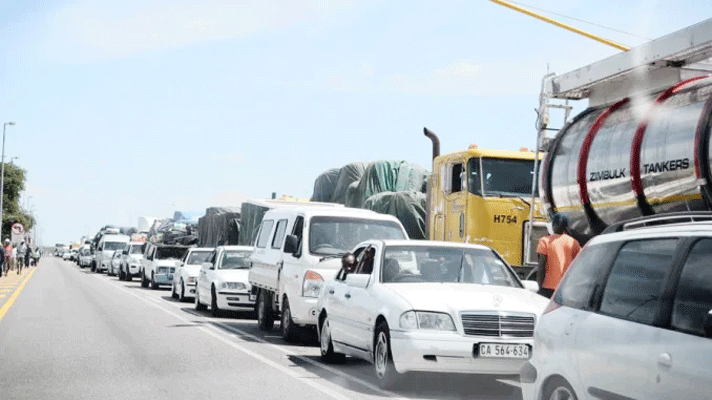
By NQOBANI NDLOVU
For Gogo MaSibanda, there have never been Christmas and New Year festivities without a family gathering.
She says every year during the festive holiday, braai and drinks flow as her children based in neighbouring South Africa return home and gather at the family homestead to celebrate Christmas Day and New Year.
But this year, the Covid-19 pandemic has taken away the joy of celebrating Christmas and New Year with her family.
Her children did not manage to return home for the festive season after toiling the year in South Africa due to the fear of being “locked-down” in Zimbabwe, which might also result in them failing to go back to work.
Zimbabwe’s borders remained closed for several months to prevent the spread of Covid-19, and MaSibanda says her children fear the worst following reports of a new strain of the virus.
“It feels like it is not the festive season for me if I will not be able to see my children even though they sent groceries through Malaicha.com,” MaSibanda narrated.
Malaicha.com is an online shopping platform that has become popular in Zimbabwe whereby Zimbabweans based abroad pay for groceries in the neighbouring country for their families back home.
- Chamisa under fire over US$120K donation
- Mavhunga puts DeMbare into Chibuku quarterfinals
- Pension funds bet on Cabora Bassa oilfields
- Councils defy govt fire tender directive
Keep Reading
Cross-border transporters, commonly referred to as omalayitsha, have for decades, also served thousands of Zimbabweans through their cross-border services.
Their operations were disrupted by the Covid-19 lockdown in South Africa and Zimbabwe, with the movement of people being restricted to stem the spread of the pandemic, and in the process birthing the online shopping platform.
“Receiving groceries through the online platforms has been helpful, but the experience of physically receiving the groceries from my sons when they alight from omalayitsha upon their return is priceless,” MaSibanda said.
“I don’t recall a year when they failed to return back home for Christmas. They would come with bags of groceries.”
Another Bulawayo resident, Gugulethu Moyo, also shares MaSibanda’s pain.
She says her brother was forced to turn back at the Beitbridge border post owing to delays in the movement of both vehicular and human traffic over the past few days.
“He ended up giving up and has gone back to South Africa,” Moyo said.
“He had been stuck there on the South African side since Sunday, December 20.”
The congestion and delays at the Beitbridge border post during the festive season are nothing new, but the Covid-19 pandemic brought with it new travel requirements, and in the process this caused protracted delays.
Travellers now have to produce a negative test not older than 72 hours before being allowed to cross the border.
Reports indicate that commercial and civilian vehicles have been stuck for days owing to the protracted delays in clearing travellers at the border post.
Queues of vehicles are reportedly stretching for as far as 20km into South Africa.
The delays are reportedly also due to closure of the border on the Zimbabwean side owing to the 10pm to 6am curfew in the country.
“Covid-19 spoiled Christmas for the family,” Moyo said.
Beitbridge border post is the only land crossing between South Africa and Zimbabwe. But due to the high volume of traffic, transit can be slow and difficult even when the border post is operating normally.
Reports last week said a Zimbabwean woman died after collapsing on the South African side of the border.
It is reported that she had been on a bus for days, complaining of fatigue and dizziness.
Another report said that on Thursday, a truck driver also died in his truck while in the queue to get clearance into Zimbabwe from South Africa.
This is also happening at a time when South Africa registered cases of a new Covid-19 variant, currently termed the 501.V2 variant.
The new Covid-19 variant has seen a number of countries such as Germany, Turkey, Israel, Switzerland and Saudi Arabia suspending flights from South Africa to prevent the spread of the variant.
In Zimbabwe, health experts are calling on authorities to do the same to prevent its spread as fellow countrymen based in South Africa return home.
“The government should be more vigilant, proactive and provide leadership by developing appropriate measures to safeguard the safety of its citizens and should thoroughly screen all the travellers coming from the United Kingdom and South Africa,” said Itai Rusike, the executive director of Community Working Group on Health.
“The government of Zimbabwe should seriously consider reintroducing increased Covid-19 lockdown restrictions on public gatherings, non-essential travel, stricter monitoring on wearing of face-masks in order to save unnecessary loss of lives as our hospitals may not be able to handle and cope with an increase in the number of sick people who may need hospitalisation.”
While Covid-19 has disrupted lives, many expressed pain that they would not be seeing their relatives who are based outside the country during the festive season.










